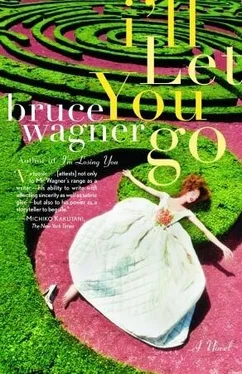†His son-in-law’s East Los Angeles outing had provided the old man an opportunity to indulge his natural curiosity of local burial grounds while at the same time catching up on Marcus’s doings.
CHAPTER 42. An Epistolary Homecoming
Trinnie decided to stay in Rancho Mirage through New Year’s, getting massaged six ways from Christmas Sunday. She asked Toulouse to come, but he declined. He wanted to be with the cousins.
What with Bluey’s crucifixion and Marcus’s resurrection, the holiday felt more like Easter anyway; family spirits were rather low. They stayed in town (everyone but Trinnie — who wasn’t, in actual Trinnie terms, really out of town), which was highly unusual at year’s end. The trauma of recent events put the dynasty on a kind of tornado watch. They hunkered down, ready to take to the cellars.
On yuletide morning, presents were exchanged at Olde CityWalk, with the most gold stars going to Lucy for her gift to her brother. During their summer hegira, the budding author picked up an exquisite weave of Mor Pakh cotton, rayon and peacock feather in Morocco and had prevailed upon Isaac Mizrahi (an old friend of her aunt’s) to design a light-hearted caftan — which Edward adored on sight.
Among the cadeaux Lucille Rose was happy to receive in turn were a bouquet of pens (among them a spiderwebbed Montblanc Octavian and a saffron-colored Omas, which paid tribute to both Buddha and the Dalai Lama) and a Louis Vuitton writing-desk trunk bestowed by Edward, in the style of the original commissioned by Leopold Stokowski. Such tools may do a young writer no harm.
Toulouse was showered with his favorites — bunches of nineteenth-century ivory bananas carved in half-peel and eerie, delicate watercolor eye portraits set in stickpins (the preceding from Edward). Lucy offered bounty for his mother — part of such largesse being that her cousin was permitted to claim that he had selected them himself — that included a truffle shaver and a bamboo-handled sterling-silver fruit-and-flower cutter. But the most precious gift, at least as far as Lucy was concerned, she saved for last, and dramatically ushered him into the Black Lantern Book Shoppe to impart: standing under hastily rigged mistletoe, she gave him everything she had.
At around two o’clock, just as Pullman was opening his own spectacular goodies (including an old-fashioned milk bucket full of his favorite white truffles), Candelaria Monasterio clopped across the cobblestones to greet the merry gang. She told Toulouse that his grandfather had asked for him; Eulogio was waiting to drive him home.
Lucy wanted to know if he had something for Grandpa Lou. Toulouse shamefacedly admitted he hadn’t. At her wise suggestion, and with her brother’s wholehearted assent, he made the sacrifice and selected a stickpin with the painted eye of Napoleon’s brother. It would do well for a dandified old man. The cunning Edward threw in a bottle of Sassicaia.

When he arrived at Saint-Cloud, the front door was open. Toulouse went in, calling for his grandfather — he knew Trinnie wouldn’t be back for at least a week. He set down the gifts, and Pullman galloped into the yard.
The defining moments of our lives are usually so called in retrospect; they rarely arrive with the unmistakability of an Olympian entering a vast arena, torch held high, to the applause of thousands. The worn epigram of the power of journey over destination still holds — and held still at the first official meeting of father and son.
Marcus and Toulouse found themselves not six feet apart, in the grassy neutral zone between the descending marble steps of Saint-Cloud and a tonnelle of pear trees that led to the formal parterres. They shifted on their feet like shy dancers at a cotillion while Mr. Trotter, a damp towel placed to his neck like a compress, made the introductions.
Mr. Weiner had been told about the existence of the boy at a special afternoon briefing in Montecito; a full complement of therapists had been employed to shore up their client if need be, while a battery of men in suits waited in the wings. Even Harry and Ruth were there to lend support. The old man himself refreshed Marcus’s memory of the wedding (over past weeks, his son-in-law had recalled much on his own that he hadn’t yet shared); his rash leave-taking; how his wife had gone on to make the best life for herself and her son that she could. Mr. Trotter said Katrina was aware of his return but was not yet prepared to see him. When Marcus asked if she had ever filed for divorce, the same therapists who had presented a united front were at odds as to whether this was a healthy question, but the old man thought it absolutely on point.
What impressed the experts most (aside from his equanimity in the face of these formidable bulletins) was that the client’s main concern appeared to be for his son’s well-being. He wanted to know how much Toulouse had been told and was keenly interested in the boy’s current emotional state and general response to his arrival on the scene. His patron said “it hadn’t been easy for him”; at that Marcus gravely nodded his head, emitting the closest thing to a Trotterian chuff that those gathered had ever heard. During this session — a session in which even professionals dropped their defenses and became teary-eyed as the client, flanked by his parents, spoke elegantly of time lost and time never to be regained — Marcus pronounced the words my Katy for the first time in more than a decade (for that is what he had always called Katrina). Remarkably, he even commented on “that dreadful tower.” But then he looked to the old man and said apologetically, “It was the most beautiful thing a father could ever have done for a daughter — I wish I’d been as beautiful for her.”
Marcus asked after her health and was satisfied by what he was told. He wished to be given the boy’s name, and smiled delicately upon hearing it. “Might I see him?” His patron said that was the purpose of this meeting; the time was nigh, and they were seeking his thoughts about a rendezvous. “Yes,” he said, with a great sigh. “I’d very much like to see the boy.” The old man wished to tell him he had already in effect met Toulouse during the trip to Boyle Heights, but the shrinks had thought better of it, cautiously theorizing that the client might misinterpret the child’s adventure as backhanded or spurious. If, they said, when he met his son he recognized him from that trip (which seemed doubtful), well, that would be something else.
And so it was he’d come to Saint-Cloud seventy pounds lighter than in SeaShelter days. As said, the epigram still held, at least for Toulouse, who felt oddly let down and now understood his mother’s reluctance toward reunion. After all, he was in her camp — he too had been abandoned.
A quick handshake — followed by an awkward span, which felt at least as long as the years his father had been away.
After an elision of chuffs, Mr. Trotter spoke up. “Well! I felt it best to just bring the two of you together.”
The boy rocked uncomfortably on his feet.
“Do you go to school, son?” asked the stranger. He had rehearsed the opener for an hour or so.
“Yes.”
“And where would that be?”
“Four Winds.”
“Sorry?”
“It’s called Four Winds,” he said impatiently. “In Santa Monica.”
“I see. That’s where I stayed awhile — over by the freeway. And what do you study there?”
“All kinds of things.”
Marcus solemnly nodded.
“Pull! Pullman!” Toulouse upbraided the dog, who was absurdly frolicking through the bushes; it irked his master no end that the Dane should be exhibiting such freakish sprightliness. A fresh torment.
Читать дальше













